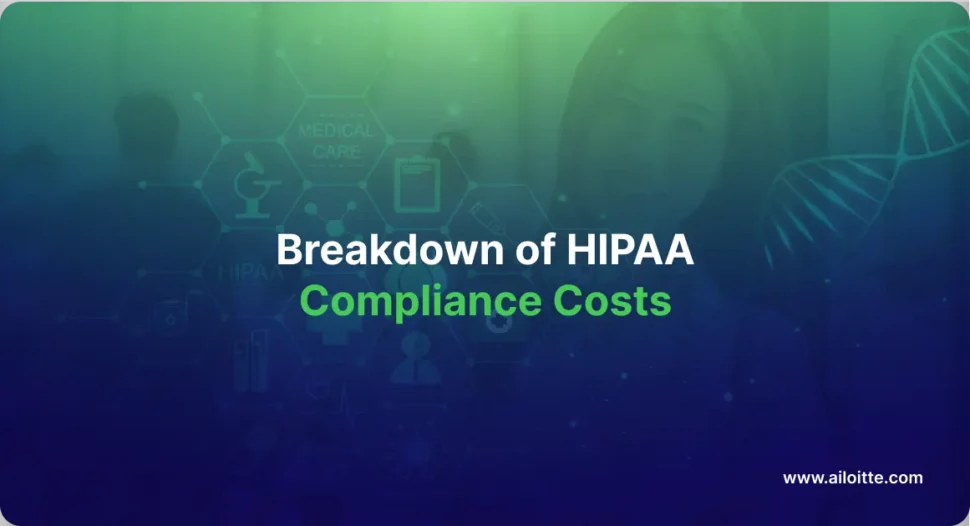Keeping patients’ information safe is super important in healthcare. In today’s tech world, following HIPAA rules is a big deal, but it can be a bit tricky to figure out the costs. Don’t worry, though! This blog explores the ins and outs of how much it costs to have servers that follow HIPAA rules in 2024. It gives you tips and things to think about to make it easier for you, healthcare buddies!
HIPAA, which stands for the Health Insurance Portability and Accountability Act of 1996, is a law in the United States that ensures your private health information is kept safe. Here’s why it’s important:
- Privacy: HIPAA lets you decide who gets to see your medical records and why. This helps prevent unauthorized access to your health information and makes sure you feel comfortable sharing it with those who need it for your care.
- Security: HIPAA tells healthcare providers, insurers, and certain businesses to use different security measures to protect their health info. This includes things like encryption and access controls, which make it harder for your information to be stolen or misused.
- Accountability: HIPAA makes sure that those in charge of your health info follow the rules. If they don’t, they can face penalties. This helps businesses focus on keeping their health data safe and encourages them to handle it responsibly.
- Public Health: When people trust that their health information is safe, they’re more likely to seek medical help when needed. This contributes to better overall public health because it encourages everyone to take care of themselves without worrying about their information being mishandled.
In simple terms, HIPAA is like a set of rules that make sure your health information stays private, secure, and handled responsibly, promoting trust and better health for everyone.
In our modern world, hospitals and clinics use computers to keep important information about patients, like their diagnoses, medicines, and treatment plans. HIPAA is a set of rules that say this information must be kept safe.
To do this, healthcare places use special servers that follow these rules. These servers make sure the information is stored securely, is protected with codes, and only the right people can access it. If healthcare places don’t use these special servers, they can get in trouble, like having to pay big fines or damage their reputation. Most importantly, it could make patients worried that their private information isn’t safe, making it hard for hospitals to provide good and safe care.
This blog is here to help you understand how much it costs to get servers that follow the rules of HIPAA in 2024. We’ll talk about the general price range and the things that can make the cost go up or down, depending on what your healthcare organization needs. Knowing these things will help you pick the right kind of server that follows the rules and fits your budget.
Understanding HIPAA & Server Costs
Regarding HIPAA compliance for servers, there are three main options: cloud, dedicated, and VPS. Each type offers different levels of control, flexibility, and cost, so choosing the right one depends on your specific needs and budget.
Here’s a detailed analysis:
Cloud servers:
- Pros: Scalable, flexible, and often with the most advanced security features available. Can be easily managed by the cloud provider, reducing your workload.
- Cons: Less control over the physical infrastructure, might not be suitable for highly sensitive data, and can be more expensive in the long run with high usage.
- Examples: Amazon Web Services (AWS), Microsoft Azure, Google Cloud Platform (GCP), HIPAA Vault.
Dedicated servers:
- Pros: Most control over the physical server, ideal for highly sensitive data or specific compliance requirements.
- Cons: Requires more expertise to manage and maintain, less scalable than cloud options, and typically the most expensive choice.
- Examples: Liquid Web, Rackspace, Atlantic.net.
Virtual Private Servers (VPS):
- Pros: Offers a balance between cloud and dedicated options, with dedicated resources within a shared physical server. More affordable than dedicated servers while offering more control than cloud options.
- Cons: Less control than dedicated servers, security depends on the provider’s implementation, and scalability might be limited depending on the resources allocated.
- Examples: Many hosting providers offer HIPAA-compliant VPS options, including those listed for dedicated servers.
Additional factors to consider:
- Business Associate Agreement (BAA): Ensure the server provider signs a BAA outlining their responsibilities for protecting patient data.
- Third-party audits: Look for providers with independent audits verifying their HIPAA compliance.
- Security features: Assess the server’s encryption, access controls, data backup and recovery procedures, and disaster recovery plan.
- Scalability: Consider your future growth needs and choose a server type that can adapt.
Ultimately, the type of server that’s best for following HIPAA rules depends on what you need and how much risk you’re comfortable with. Consulting with a healthcare IT expert can help you make the right choice.
It’s important to differentiate between “server cost” and “HIPAA compliance cost” when making a decision.
Server Cost:
This refers to the direct cost of the server itself, whether it’s a cloud instance, dedicated server, or VPS. It typically includes:
- Hourly/monthly rental fees: For cloud and VPS options.
- Leasing or purchasing costs: For dedicated servers.
- Data transfer fees: For cloud options, depending on usage.
- Management fees: If you opt for managed server services.
HIPAA Compliance Cost:
HIPAA Compliance Cost is the additional cost associated with ensuring your server environment meets HIPAA compliance regulations. They go beyond the basic server cost and might include:
- Security software: Firewalls, intrusion detection/prevention systems, encryption tools, etc. (monthly subscriptions or one-time licenses).
- BAA agreement processing fees: This covers the costs when your server provider agrees to sign a Business Associate Agreement (BAA).
- HIPAA compliance training: Training for your employees on HIPAA regulations and security best practices (per user fees).
- Penetration testing and vulnerability scans: Regular testing to identify and address security weaknesses (annual or on-demand fees).
- Compliance audits: Costs associated with independent audits to verify your compliance (one-time or periodic fees).
Following HIPAA rules isn’t a one-time cost. It means you need to keep spending money to keep things secure and up-to-date. The smart way is to find a good balance between how much your server costs and the important things you need to do to follow the rules, based on your risks and budget.
Breakdown of HIPAA Compliance Costs

Server Cost:
- Type of Server:
- Cloud Servers: Price ranges vary greatly depending on the provider, and resources like CPU, RAM, storage, and data transfer volume.
Examples:- Low-end: $5-10/month (limited resources)
- Mid-range: $20-50/month (balanced for most workloads)
- High-end: $100+/month (powerful instances for large datasets)
- Dedicated Servers: Typically more expensive than cloud, but offer full control and customization.
Example price ranges:- Entry-level: $200-400/month
- Mid-range: $500-1000/month
- High-performance: $1000+/month
- VPS: Offers a balance between cloud and dedicated. Prices are based on allocated resources, similar to cloud ranges but slightly higher due to dedicated space within a shared server.
- Cloud Servers: Price ranges vary greatly depending on the provider, and resources like CPU, RAM, storage, and data transfer volume.
Additional Cost Factors:
- Storage: Additional fees for exceeding included storage, usually per GB.
- Bandwidth: Cloud servers often charge for outbound data transfer, impacting high-volume scenarios.
- Processing power: Increased CPU and RAM needs lead to higher server costs across all options.
Managed vs. Unmanaged:
- Managed servers: The provider handles setup, maintenance, and security updates for an additional fee (typically 20-30% of server cost). Suitable for organizations lacking IT expertise.
- Unmanaged servers: More affordable but require internal IT resources for management and security, potentially offsetting cost savings.
Additional Compliance Costs:
- HIPAA compliance software and tools: Costs vary depending on features and functionality.
Examples:- Encryption tools: $100-500+/month
- Security information and event management (SIEM): $500-1000+/month
- Data loss prevention (DLP): $200-500+/month
- Security audits and penetration testing: Annual or bi-annual costs ranging from $2,000-$10,000+ depending on scope and complexity.
- Training and employee awareness programs: Per-user fees or fixed pricing for online training modules, or in-person training costs per instructor and attendee.
- Business Associate Agreements (BAAs): This may involve processing fees from vendors, typically ranging from $50-$200 per BAA.
*Note: These cost estimates are just rough guesses, and the actual prices may change depending on what you specifically need and which providers you choose. It’s important to find the right balance between how much you spend on servers and the security measures you need to follow the rules. Getting advice from a healthcare IT expert can make it easier for you to figure out the costs and make smart choices.
As a HIPAA-compliant software development company, we provide a very affordable & flexible price for the HIPAA-compliant server.
Factors Affecting Server Cost
Let’s break down the key factors that influence the cost of a server, incorporating the most valuable points from earlier explanations and including additional insights:
Organizational Needs:
- Size and data volume: Larger organizations with more users and data require bigger, more powerful servers, increasing cost across deployment models.
- IT infrastructure complexity: Basic setups can use affordable shared hosting or VPS, but advanced setups with integrations, containerization, or private cloud solutions usually cost more.
- Compliance requirements: HIPAA, PCI, or other regulations often demand specific security features and configurations, impacting server costs.
Hardware Specifications:
- Processor (CPU): More cores and higher clock speed increase cost, impacting processing power for demanding tasks.
- Memory (RAM): More RAM for tasks like databases or high user traffic leads to higher costs.
- Storage: Capacity and type (HDD vs. SSD) affect cost, with SSDs being faster but pricier.
- Networking: Faster network cards that can handle big data transfers cost more money and are important.
Deployment Model:
- Cloud Servers: Cost depends on the provider, resource allocation (CPU, RAM, storage), and data transfer. Offers scalability and lower upfront costs.
- Dedicated Servers: More expensive due to exclusive access, offering high performance and customization but requiring more technical expertise.
- Virtual Private Servers (VPS): Provides a balance between cloud and dedicated, with costs depending on allocated resources and provider.
Software and Licensing:
- Operating System: Licensing fees for Windows Server or specific Linux distributions can vary.
- Security Software: Firewalls, anti-malware, encryption tools, and other security measures incur licensing costs.
- Management Software: Optional tools for server monitoring and management add to the cost.
Additional Services:
- Managed Services: Providers handle server management and maintenance for an additional fee, reducing internal workload but increasing cost.
- Data Backup and Recovery: Ensuring data protection involves storage and service fees.
- Support and Maintenance: Optional support contracts assist with technical issues, adding to the cost.
Other Factors:
- Data Center Location: Costs may vary depending on the data center’s region and infrastructure.
- Power Consumption: More powerful servers consume more energy, adding to the cost.
- Scalability: The ability to scale resources up or down can impact long-term costs.
- Desired security features: Advanced security like multi-factor authentication and vulnerability scanning add licensing and implementation costs.
- Level of managed services: More hands-on support from providers increases the price.
Server cost is an ongoing expense, considering maintenance, software renewals, and potential upgrades.
The optimal choice depends on your specific needs, budget, and technical expertise.
Consulting with a server provider or IT professional can help you determine the most cost-effective solution for your requirements.
Also Read: Top 5 Best Strategies for Complying with HIPAA Compliance in Software Testing
Cost-Saving Strategies

These are the best cost-saving strategies for HIPAA-compliant servers:
Starting Small and Scaling Up:
- Right-size your server for current needs: Avoid overprovisioning resources to save on server cost and power consumption. Scale up as your data volume and user base grow.
- Consider pay-as-you-go cloud options: Cloud providers offer flexible pricing models where you only pay for the resources you use, ideal for unpredictable workloads.
Comparing Vendor Pricing:
- Shop around for competitive offers: Ask different cloud companies and server sellers for prices. Compare what they offer and how much it costs. Try to talk and get a better deal if you can.
- Use open-source alternatives: Explore open-source options for certain server software and security tools, considering licensing costs and potential support limitations.
Open-Source HIPAA Compliance Tools:
- Check out free security tools: Programs like Fail2ban, OSSEC, and ClamAV give you basic security for no cost. But, using them might need some tech skills to set up and keep them working.
- Assess functionality and support: Balance cost savings with feature availability and adequate support options to ensure long-term effectiveness.
Investing in Employee Training:
- Prevent mistakes: Teach your team about HIPAA rules, the best ways to keep data safe, and how to spot phishing scams. This helps lower the chance of data problems and saves money on fixing them.
- Check the savings: See how much money you could save by avoiding a data problem compared to what you spend on training.
Additional Cost-Saving Strategies:
- Use computer programs to do regular security jobs like automatically checking for weaknesses and fixing problems. This saves time and reduces mistakes.
- Try out free trials and discounts from companies before you decide, especially if you’re thinking about using cloud services.
- Talk to the companies to get lower fees for processing agreements, especially if you’re doing a lot of them.
- Think about working with companies that manage services for you. They know a lot, and it might be cheaper for what you need
Using these strategies, you can achieve HIPAA compliance while keeping server costs under control.
Conclusion
HIPAA compliance adds to your server costs, but strategic choices can help you manage them effectively. Factors impacting cost include your organization size, data volume, desired security features, chosen server type (cloud, dedicated, VPS), and managed service level.
When it comes to following the HIPAA rules, figuring out how much to spend on servers can be tricky. It’s important to stick to your budget, but cutting corners on security and following the rules can lead to big problems like data leaks, expensive fines, and a damaged reputation. Finding the right balance is really important.
Spending money on good security tools, training your team, and having reliable servers might seem like a cost, but it’s an investment in keeping your patients’ information safe and avoiding big money and legal troubles later on.
Consult with healthcare IT professionals to figure out costs and find solutions that fit your budget while still following the HIPAA rules. When you focus on both saving money and staying secure, you can feel confident that your important data is safe without spending too much.
FAQs
Healthcare organizations and business associates must ensure that cloud servers storing, processing, or transmitting PHI adhere to HIPAA requirements. HIPAA sets strict standards for the security and privacy of protected health information (PHI).
Several HIPAA-compliant hosting solutions offer HIPAA-compliant web hosting to protect electronically protected health information (ePHI), including Dreamhost, Bluehost, InMotion Hosting, Liquid Web, SiteGround, A2 Hosting, and GoDaddy.
HIPAA-compliant hosting is a service most often provided by cloud service providers that enables covered entities and business associates to take advantage of a hosting environment that complies with the HIPAA Security Rule standards.
The Health Insurance Portability and Accountability Act (HIPAA) defines the security and privacy regulations required to protect sensitive patient health information.
The Security Rule requires appropriate administrative, physical, and technical safeguards to ensure the confidentiality, integrity, and security of electronically protected health information. The Security Rule is located at 45 CFR Part 160 and Subparts A and C of Part 164.
Leave a Reply
Need help?
Let's simplify: Find the best healthcare IT solution for you!


















.png)
.png)
.png)



Leave a Comment